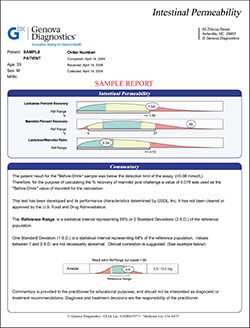Intestinal Permeability Assessment - Vancouver, BC

Did you know that more than half of your functioning immune system is located in your digestive tract? The small intestine plays a vital role in preventing the absorption of viruses and bacteria, helping prevent you from contracting a variety of illnesses. Increased intestinal permeability can lead to a breakdown in immune functions, leaving you susceptible to a number of conditions. Identifying how well your small intestine is functioning in this capacity can lead to breakthroughs in overall health and wellbeing.
Click here for a sample profile (pdf)
The Basics
Intestinal permeability is the integrity of the mucosal layer within the digestive tract. This protective layer is essential for preventing antigens, bacteria, and undigested food proteins from traveling through the gastrointestinal barrier and entering the systemic circulation. When the mucosal layer becomes compromised, the results could be an immune up-regulation. Diagnosing intestinal permeability can be difficult without the help of tests as symptoms can greatly range from emotional to gastrointestinal distress.
The Intestinal Permeability Assessment is a non-invasive, yet powerful, assessment of barrier function of bowel and small intestinal absorption. Also known as “leaky gut” intestinal permeability, as well as malabsorption, is associated with chronic gastrointestinal imbalances and other systemic disorders. As a digestive absorption organ for nutrients and powerful mechanical and immune barrier against excessive absorption of food antigens, bacteria, and other macromolecules, the small intestine is highly important to how the body functions.
Approaching Intestinal Permeability
One of the best ways to measure intestinal permeability is through an Intestinal Permeability Assessment. Evaluating food sensitivities can allow you to better find a treatment plan that will reduce your exposure to certain foods in which you are sensitive to. A change in diet is sometimes all that is needed to make a world of difference in how you feel. Our testing measures how well your small intestine is working to better allow you to make the necessary changes for your health. There are a number of symptoms that could indicate intestinal permeability, including:
- Memory issues
- Fatigue
- Allergies
- Headaches
- Gastrointestinal issues
- Immune up-regulation
- Mood variations
- Trouble concentrating
Negative Impacts
Intestinal permeability can be affected by a number of factors, such as microbiological imbalances (toxic chemicals, yeast-candida overload, alcoholism, blood poisoning) and intestinal infections. There are a number of illnesses that are associated with chronic gastrointestinal imbalances, including:
- Food allergies
- Inflammatory joint disease
- Failure to thrive
- Inflammatory bowel disease
- Worsening of gluten sensitivity
- Colitis, gastritis, Crohn’s disease
- Chronic skin disorders
- Malabsorption
Treatment
Treating intestinal permeability is crucial for better wellbeing. A healthy gut prevents undigested food proteins and other toxins from being absorbed by the bloodstream. Maintaining the health of the lining of your stomach is important as more than 50 percent of your immune system is located within your gut. Having intestinal permeability or “leaky gut” can cause foods that would otherwise be harmless to leak into your bloodstream, resulting in allergic reactions. This allergic reaction arises when the body views the leaking food as a threat. Treating it will stop this auto-immune response.
Undergoing testing and treatment is not only important for your physical health, but also your mental health. Your stomach is considered to a second brain, as it contains 95 percent of serotonin produced in the body. When you suffer from a leaky gut, the level of serotonin is disturbed, causing a variety of mental problems, such as eating disorders and depression. Healing your leaky gut can eliminate these types of problems.
Call Us Today
At Vitalia Healthcare in Vancouver, we offer Intestinal Permeability Assessment Testing, in addition to a wide range of other service. To learn more about the testing and treatments we provide or to schedule an appointment, call 1-604-566-WELL (9355).


